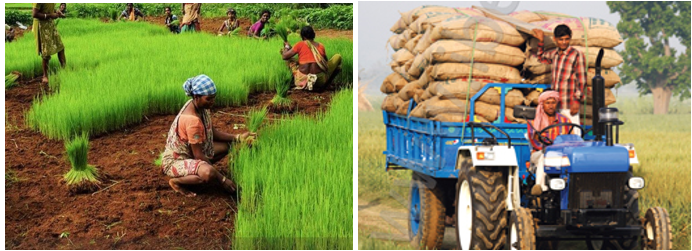In prelims as well as mains stage of the civil services examination, questions related to agriculture now has become one of the core areas of UPSC. As agriculture as subject has overlapping components with Geography, Economy and Environment sections of IAS Mains syllabus, so aspirants should have very much command on this subject as there is greater probability that questions will be asked from Agriculture section for sure.
Here we are providing important topics in Agriculture for UPSC Exam. You will find tips on how to crack Agriculture in UPSC IAS exam. Below you will find all important topics in Agriculture for UPSC Exam so that you can prepare wisely. Find out strategy to prepare for Agriculture related questions for IAS Exams.
Agriculture-related questions in both prelims and mains can be categorised in to three broad ways in which UPSC asked question generally.
- Government Schemes, Policies and Acts portion of Current Affairs
- Agriculture Cultivation & Irrigation Practices
- R&D, Genetic engineering-related questions
Major question then arises, how/What to read for Preparing for Agriculture Related topic coverage. Aspirants can follow certain steps to equip themselves for this segment.
Understand the Syllabus & Pattern of asking Question Related to Agriculture:
Aspirants are advised to give their first priority to understand the syllabus of mains syllabus of Agriculture portion then analyse the pattern of asking questions in agriculture portion. Understanding the pattern of asking questions will help aspirants in making their own plan of action to tackle different types of questions. For Example, Some of the questions will be asked directly from the fixed static portion on the other hand, few other types of questions will be asked from current affairs portion of dynamic segments like:
|
Static(Fixed) Bookish Questions |
Static +Dynamic(Current) Questions |
|
Q. What are the advantages of fertigation in agriculture?
Select the correct answer using the code given below: a) 1, 2 and 3 only b) 1, 2 and 4 only c) 1, 3 and 4 only d) 2, 3 and 4 only |
Q. With reference to the current trends in the cultivation of sugarcane in India, consider the following statements:
Which of the statements given above is/are correct? a) 1 and 2 only b) 3 only c) 1 and 4 d) 2, 3 and 4 only |
Link Static Portion with Dynamic Portion (Current Affairs):
Aspirants are advised to build their approach of learning in such a way that there should be linkage of static portion with Dynamic portion also called Current Affairs. E.g. If you are reading about Kharif and Rabi Crops news of recent times then you should also read about the static portion of which all crops will come under the Kharif and Rabi Crops at the simultaneous time.
Students must ensure that they should focus on sustainability and economic dimensions of any news. Some examples must correspond to recently debated issues in various different areas. It is highly recommended that aspirants should follow bird’s eye approach (Gazing all news through fixed Sources) to prepare for agriculture-related news.
Follow the Approach of What/Why/How:
Aspirants should develop the approach of asking questions on any given topic while reading. For Example; take an example of fertilizer Subsidy. Aspirants should follow the approach of; what are the impacts of Fertilizer subsidy, how fertilizer subsidy scheme will be implemented and why fertilizer subsidy is implemented.
If aspirants follow this scheme of things approach then there will be more probability of solving majority of the questions related to agriculture portion.
At last, I would suggest you follow these suggestions given above, work hard and you can solve majority of the questions related to Agriculture subject. For more information, you can go through with link: https://iasscore.in/topical-analysis/climate-smart-agriculture
Related Articles





